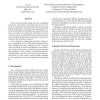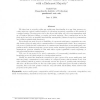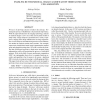132
Voted
P2P
2008
IEEE
15 years 9 months ago
2008
IEEE
We propose an efficient framework for enabling secure multi-party numerical computations in a Peer-to-Peer network. This problem arises in a range of applications such as collabo...
127
Voted
ASIACRYPT
2009
Springer
15 years 9 months ago
2009
Springer
We present a new construction of non-committing encryption schemes. Unlike the previous constructions of Canetti et al. (STOC ’96) and of Damg˚ard and Nielsen (Crypto ’00), ou...
126
Voted
ASIACRYPT
2009
Springer
15 years 9 months ago
2009
Springer
Abstract. Secure multi-party computation has been considered by the cryptographic community for a number of years. Until recently it has been a purely theoretical area, with few im...
121
Voted
SAC
2009
ACM
2009
ACM
On the practical importance of communication complexity for secure multi-party computation protocols
15 years 9 months ago
Many advancements in the area of Secure Multi-Party Computation (SMC) protocols use improvements in communication complexity as a justification. We conducted an experimental stud...
112
Voted
HICSS
2009
IEEE
15 years 9 months ago
2009
IEEE
Privacy preserving data mining has been investigated extensively. The previous works mainly fall into two categories, perturbation and randomization based approaches and secure mu...
136
Voted
STOC
2004
ACM
16 years 3 months ago
2004
ACM
We propose a modification to the framework of Universally Composable (UC) security [3]. Our new notion, involves comparing the protocol executions with an ideal execution involvin...
121
Voted
STOC
2004
ACM
16 years 3 months ago
2004
ACM
We show how to securely realize any multi-party functionality in a way that preserves security under an a-priori bounded number of concurrent executions, regardless of the number ...
127
click to vote
ICIP
2007
IEEE
16 years 4 months ago
2007
IEEE
Privacy is of growing concern in today's day and age. Protecting the privacy of health data is of paramount importance. With the rapid advancement in imaging technology, anal...




